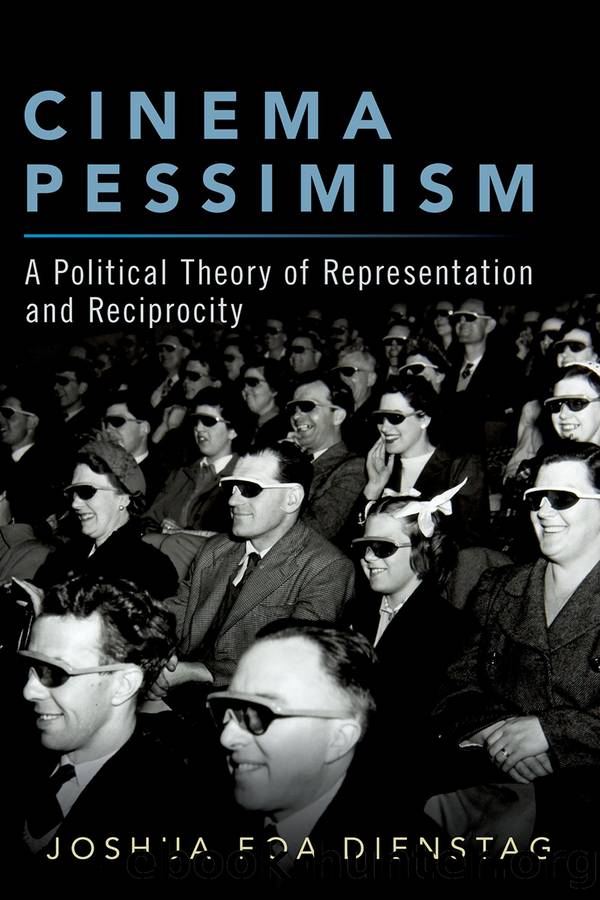Cinema Pessimism by Joshua Foa Dienstag

Author:Joshua Foa Dienstag
Language: eng
Format: epub
Publisher: Oxford University Press
Published: 2019-06-15T00:00:00+00:00
Europa: Political Evil
Europa was made before the Dogma 95 manifesto was written and does not conform to its principles. But Europa makes heavy use of the second path to anti-cinema: even as it tells a fictional story, it relentlessly calls attention to itself as a film through a variety of techniques that disrupt the viewerâs suspension of disbeliefâmost notably through a jarring mix of black-and-white and color film stock that make the characters appear as if they are dropping in and out of different movies.9 There is also a voice-over narration that speaks directly to the audience and depicts the film as a kind of hypnotic dream. The story begins with a view of train tracksâshot from a moving train so that they look like a filmstripâwhile the narrator says things like âI will now count to ten . . . On the mental count of ten you will be in Europa. Be there at ten. I say: ten.â The audience is thus repeatedly reminded that what it is seeing is an illusion or dream of some kind.10
Set in the fall of 1945, Europa tells the tragicomic story of Leopold Kessler, an American of German descent who has come to Germany to work (as a civilian) for a railway company called Zentropa.11 Kessler has no sympathy for Nazism, but as a pacifist, he refused to participate in the war. When asked his reasons for coming to Germany, he says, in apparent seriousness, âItâs about time someone showed this country a little kindness.â
Kessler meets Katherine Hartmann, the daughter of the family that owns the Zentropa train company.12 The company is under pressure both from the occupation authorities that want its resources to rebuild Germany and from the Werewolves, Hitler loyalists who want to attack the occupation.13 Kessler falls in love with Katherine and marries her shortly after these conflicting forces drive her father to commit suicide. In the end, Katherine is herself revealed to be a Werewolf, and she and Kessler are killed when a Werewolf bomb that she planted goes off and plunges their railway car into a river.
The real subject of Europa is the evil of Nazism and our response to it. But the Nazis themselves remain off-camera. We see no German soldiers; instead, the uniforms of the railway employees look menacingly fascist. We see no atrocities, but Kessler is subjected to a bizarre medical exam before being allowed to join the railway company, as if he were in a camp. The trains themselves, of course, are a constant reminder of genocide since, as everybody knows (and as von Trier shows us in one dream-like sequence), they were used to transport millions to their deaths.
Kessler himself, however, is strangely or willfully blind to these associations.14 When ominous things happen, he says they can be âeasily explained.â When his sinister uncle says, âThere is nothing to see,â Kessler doesnât question it. And when the railway regulations require absurd acts, he does not objectânot until the last moments of the film.
How,
Download
This site does not store any files on its server. We only index and link to content provided by other sites. Please contact the content providers to delete copyright contents if any and email us, we'll remove relevant links or contents immediately.
Naked as Nature Intended by Pamela Green(451)
The Filmmaker's Guide to Creatively Embracing Limitations: Not Getting What You Want Leading to Creating What You Need (for True Epub) by Pace William & Stobbe Ingrid(445)
30 Movies to Get You Through the Holidays by Roger Ebert(418)
Bond, James Bond by Brad Gilmore(386)
It's Only a Movie! by Haberski Jr. Raymond J(354)
The Making Of Horror Movies by Jennifer Selway(330)
How To Write A Novel The Easy Way Using The Pulp Fiction Method To Write Better Novels: Writing Skills by Jim Driver(312)
Chinese films in focus II by Unknown(311)
Smartphone Cinema: Making Great Films with Your Mobile Phone by Bart Weiss(310)
The Fellowship of the Knits: Lord of the Rings: The Unofficial Knitting Book by Tanis Gray(308)
Charles McGraw by Alan K. Rode(289)
Film Truth; November, 1920 by Anonymous(287)
Thomas Mann and Friedrich Nietzsche: Eroticism, Death, Music, and Laughter by Caroline Joan Picart(286)
The Greatest Show on Earth by Jerry Pinto(284)
The Romanian Cinema of Nationalism: Historical Films as Propaganda and Spectacle by Onoriu Colăcel(268)
Jurassic Park and Philosophy by Watkins Jessica Michaud Nicolas(264)
The Garden in the Machine by Unknown(259)
Jafar Panahi: Interviews by Unknown(257)
The Reel Truth by Reed Martin(257)
